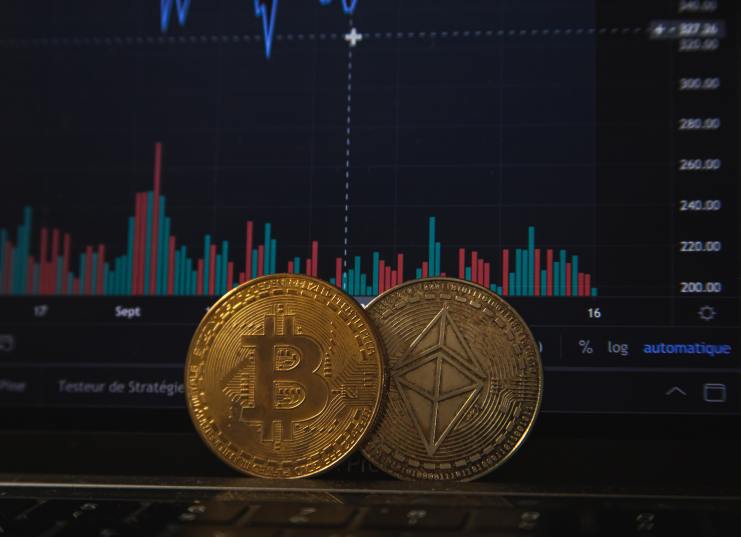Crypto donations continue to pour into Ukraine’s war effort

Review of the the last seven days in crypto, with Francisco Memoria…
Data from CryptoCompare shows that the price of Bitcoin started the week trading sideways before surging to a $42,000 high. As macroeconomic factors affected the cryptocurrency’s price, it dropped back to $39,000.
Ethereum’s Ether – the second-largest cryptocurrency by market capitalisation – moved in a similar way, moving to a $2,750 high over the week, before plunging to trade roughly at $2,600.
Headlines last week were dominated by Russia’s invasion of Ukraine and how it affected cryptocurrency markets. The Ukrainian government asked cryptocurrency trading platforms to block all Russian users, but leading platforms like Coinbase and Binance denied these requests, saying they would block sanctioned individuals only.
Shortly after, Nasdaq-listed cryptocurrency exchange Coinbase revealed it blocked more than 25,000 cryptocurrency addresses linked to Russian individuals or entities that it believes have been engaging in illicit activity.
The blocked addresses represent about 0.2% of Coinbase’s 11.4 million month transacting users. In a blog post, Paul Grewal, Coinbase’s Chief Legal Officer, said the firm banned access for sanctioned individuals and is using blockchain analytics to identify addresses potentially linked to them.
Over the week, cryptocurrency donations supporting Ukraine also rose. Alex Bornyakov, Ukraine’s deputy minister at the Ministry of Digital Transformation, has revealed Ukraine has received “close to $100 million” in cryptocurrency donations. More than $60 million of those were received in the main fund run by local crypto exchange Kuna.
Bornyakov detailed that the rest of the donations were sent to several other smaller funds. Asked whether Ukrainian President Volodymyr Zelensky had a view on the role of crypto in the war, Bornyakov replied “he shares our vision” that the use of crypto could be a “breakthrough from an economic standpoint”.
Russia’s invasion of Ukraine has also seen blockchain analytics firm Chainalysis launch two new tools meant to make crypto sanctions compliance easier. The tools include an oracle and an API meant to help anyone verify if a cryptocurrency wallet has “been included in a sanctions designation”.
Through Chainalysis’ tools, users can “easily validate if they are interacting with cryptocurrency wallets associated with sanctioned entities”. In a press release, the firm added that, given the transparency of blockchains, it would be hard for the Russian government or financial elite to “systematically evade sanctions at scale through cryptocurrency without detection”.
The way has also led to the market capitalisation of gold-backed cryptocurrencies exploding 60% so far this year to now surpass $1 billion for the first time in history. Investors have been allocating funds to the precious metal and gold-backed cryptoassets in a flight to safety.
Cryptocurrencies like PAX Gold (PAXG) and Tether Gold (XAUT) have outperformed the flagship cryptocurrency Bitcoin so far this year as gold itself rose almost 14% year-to-date. The precious metal is being used as a safe haven at a time in which inflation is soaring and amid Russia’s invasion of Ukraine.
Ethereum competitors’ total value locked keeps rising
Over the week, the highly competitive decentralised finance (DeFi) space saw Ethereum competitors like Terra (LUNA), Solana (SOL), Avalanche (AVAX), and Binance Smart chain (BNB) keep gaining ground against ETH itself.
Terra became the second-largest DeFi ecosystem with a total value locked above $25 billion, while for comparison, Ethereum’s total value locked is at the time of writing near $110 billion. ETH’s dominance dropped from a 95% peak last year to 54%.
Notably, the total amount of fees spent on the Ethereum network declined in February after rising in the month before. Total fees paid dropped 49.8% to $673 million, with the average fee per transaction dropping 43.5% to $21.25.
CryptoCompare’s Asset Report details the total transactions fees spent on Ethereum dropped along with its total value locked. While fees dropped, average daily active addresses on Ethereum grew 1.56% to 595,000 last month.
Over the week it was revealed Goldman Sachs is offering interested clients access to an ETH fund issued by Galaxy Digital. Goldman Sachs received an introduction fee for clients it brings to the Galaxy Institutional Ethereum Fund.
Biden’s crypto Executive Order to support ‘responsible innovation’
An issued statement on the White House’s long-awaited crypto executive order, from US Treasury Secretary Janet Yellen that has since been taken down stated that “Biden’s historic executive order calls for a coordinated and comprehensive approach to digital asset policy”.
The statement added that this approach will “support responsible innovation that could result in substantial benefits for the nation, consumers, and businesses”. It also mentions that it will address risks related to illicit finance, consumer and investor protections, and threats to the financial system and the broader economy.
READ MORE: What does Biden’s Bitcoin Bill mean for the future of crypto?
Meanwhile in South Korea, the leader of the country’s People Power Party, Yoon Suk-yoel, became the country’s new president after securing roughly 49% of the votes. His campaign pledged to deregulate the country’s cryptocurrency industry.
Yoon declared that it was necessary to “overhaul regulations that are far from reality and unreasonable” during an event in South Korea’s capital Seoul. He has said there’s a need to “shift to a negative regulation system to ensure at least the virtual asset market has no worries”.
Francisco Memoria is a content creator at CryptoCompare who’s in love with technology and focuses on helping people see the value digital currencies have. His work has been published in numerous reputable industry publications. Francisco holds various cryptocurrencies.
Featured image via Unsplash.